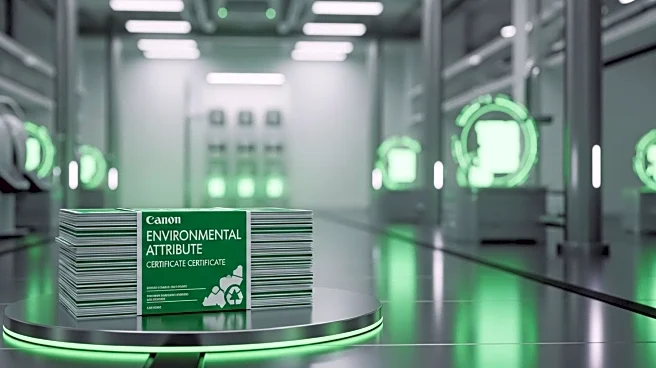What is the story about?
What's Happening?
The World Economic Forum is advocating for the use of Environmental Attribute Certificates (EACs) as a tool to accelerate decarbonization in heavy industries. EACs allow industries to monetize low-carbon production by separating the environmental attributes of a product from its physical entity, enabling transparency and scalability in reducing emissions. This approach is seen as a practical solution for industries facing challenges in achieving net-zero emissions due to capital-intensive assets and thin margins. The certificates are expected to play a significant role in meeting Scope 3 emissions reduction targets, which many companies aim to achieve by 2030.
Why It's Important?
The introduction of EACs could significantly impact the U.S. industrial sector by providing a viable pathway to decarbonization without the need for extensive infrastructure changes. This could lead to increased investment in low-carbon technologies and create new market opportunities for industries that adopt these certificates. The broader adoption of EACs may also influence public policy and corporate strategies, as companies seek to align with evolving standards and meet climate commitments. The potential for EACs to transform decarbonization from a cost center to a value opportunity could drive economic growth and innovation in sustainable practices.
What's Next?
As the demand for low-carbon products grows, industries are likely to increase their use of EACs to meet corporate climate commitments. The development of market infrastructure for transparency and data quality will be crucial for the widespread adoption of EACs. Companies may need to invest in digital traceability and collaborate on common rulebooks for generating and exchanging certificates. The alignment with international standards will be essential to ensure the credibility and comparability of EACs across different sectors.
Beyond the Headlines
The use of EACs raises ethical and legal considerations regarding the verification and auditing of environmental attributes. As industries transition to low-carbon production, there may be cultural shifts in consumer behavior and corporate responsibility. The long-term implications of EACs could include changes in supply chain dynamics and increased pressure on industries to innovate and reduce their carbon footprint.















